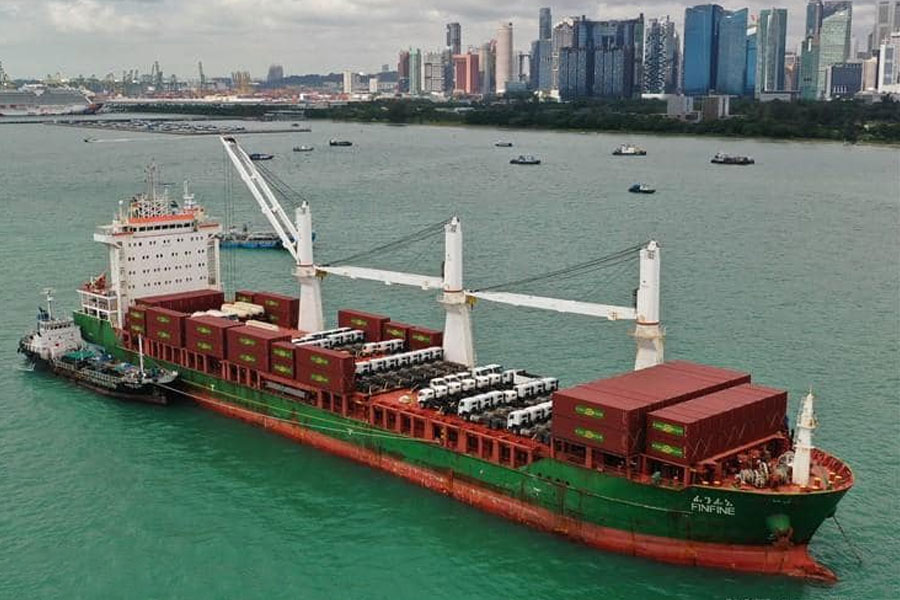
The rhythmic hum of trucks unloading grains and labourers hauling their weighty bounties has been a defining feature of the Ehel Berenda section around Autobis Tera of Mercato for decades. The hub, vital for distributing spices and grains across Addis Abeba, fell ominously silent over the past weeks. A culmination of regional strife and supply chain disruptions has hit the heart of the city’s grain trade.
In a startlingly brief period, the price of Teff, a staple grain deeply woven into the fabric of Ethiopian culinary culture, has experienced a jolting rise. Two weeks ago, a quintal of Teff saw an increase of 1,500 Br. In some regions, that figure has doubled.
The trajectory of escalating prices and the unyielding march of daily expenses squeezes households across the city. As Ethiopia grapples with regional strife, its ripple effects on the plates of its citizens underline the deeply interconnected tapestry of security and daily sustenance.
The ramifications are felt acutely across the spectrum. For the wealthier, it is a matter of price adjustments. For the majority, like Shakira Kemal, a mother of three and a resident in Addis Abeba, the surge is felt in every meal, every decision.
“Just enough to make it past each month is what I pray for,” she told Fortune.
The underlying cause is a multifaceted blend of recurrent militarised conflicts in the larger regional states and market speculations. Wholesalers have pointed to the reduced number of drivers making the once routine trip to the Amhara Regional State, contributing to a staggering 40pc of national grain consumption. It is now engulfed in the shadow of a state of emergency decree and a command post, a consequence of escalating conflict.
The absence of white teff, mainly sourced from farmers in the Amhara Regional State, on market shelves underlines the depth of the crisis. But the price hikes are not confined to this region. Qey teff, preferred by many for its relatively low cost, now fetches up to 3,000 Br more for a quintal. Teff from the Ad'a and Abote areas in the Oromia Regional State has witnessed price increases of 2,700 Br and 1,800 Br for a quintal, respectively.
Henok Teferi is a seasoned wholesaler in Ehil Berenda. He saw prices of teff from Wolenkomi town in the Oromia Regional State jump, evidence of the broader market turbulence.
"There is no conflict there," he observed. "But prices have gone up."
There is a growing and palpable sense of anxiety among market players, including intermediaries, traders, and drivers. They are bracing for sustained interruptions in the supply chain. Intermediaries are particularly apprehensive that price stabilisation is unlikely to be on the horizon devoid of regular transport resumption in the Amhara Regional State.
Jemal Abdellah, an intermediary in the grain market, was shocked to see the price of a quintal of teff rise to 15,000 Br.
"I never thought I would come to see this in my lifetime," he said.
Logistic experts paint an even grim forecast.
They underscore that while teff is harvested in December, the bulk of the stock is already distributed among traders at this juncture. They see the current price surge stemming from the expectations of a lingering supply crunch.
One of these experts is Matiwos Ensermu (PhD), an associate professor of Logistics & Supply Chain Management at Addis Abeba University. He warns that the consequences could be dire if the turbulence in the Amhara region remains unabated as the harvest season looms.
"That will cause a real supply shock," Ensermu warned. "And an inevitable rise in prices."
While recent reports from the Addis Abeba Trade Bureau highlighted a 37pc rise in teff prices from the previous year, they have not factored in the recent dramatic surges. However, the gravity of the grain shortage in the capital is not lost on them. Biniyam Mikru, head of the Bureau, recently addressed trade officials from various districts at the Elily Hotel. He candidly recognised the supply chain derailment stemming from the security crisis in the Amhara region.
Nonetheless, Mikru was quick to highlight the limitations of regulatory interventions in such scenarios.
"Market dynamics, ultimately, are determined by forces beyond administrative control," he said. "Only a surplus can genuinely reverse inflation."
According to Central Bank Governor, Mamo Mehiretu, improving the supply side of the inflationary equation is one of the areas the government will have a strong response in fighting what he described as an "enduring challenge" to Ethiopia`s macroeconomic managment.
Mesfin Assefa, deputy head of Addis Abeba`s Trade Bureau, echoed these sentiments, emphasising the critical importance of enhancing efficiency and productivity as long-term strategies against inflation. He highlighted a 1.4 billion Br revolving fund that traditionally subsidises essential commodities like sugar and edible oil. Given the present teff crisis, the Bureau is contemplating redirecting portions of this fund to stabilise prices, especially with the New Year holiday season approaching.
The Bureau is looking for ways to have farmers directly supply consumers through the 172 Sunday markets in the capital at lower prices, Mesfin disclosed to Fortune.
However, the grains' market woes are hardly restricted to teff alone.
Maise, a staple for many Ethiopians, has also witnessed skyrocketing prices. With Amhara and Oromia regional states accounting for 82pc of national maise production, the conflict's ripple effects are felt deeply. A recent study published by the academic journal, SpringerNature, brought to attention the fragility of this ecosystem: a 20pc dip in maise yield can trigger a 70pc price surge. A five Birr markup price for a kilo in Ehel Berenda is observable at the local mill, with prices showing a 500 Br rise from wholesale prices.
Local businesses, like the grain mill managed by Andualem Abebe in the Gotera area of Addis Abeba, are grappling with this volatile landscape. He saw hurdles in inter-regional transportation were harbingers of these price hikes. Adapting to the shifts, his mill has slashed its bi-weekly supply from 40qtl to a mere 10qtl, awaiting market stabilisation.
"We lower what we bring in when sudden price increases occur," he told Fortune.
While Andualem observed most customers have opted to cut back on their purchases by a kilogram, he said they continue buying as most items are considered necessities.
For everyday citizens, the challenges are starker. With commodity prices soaring and wages remaining stagnant, households face excruciating choices. Shakira's story encapsulates this struggle. Last month, she bought Sergenga teff for 85 Br a kilo. Now, the price has shot up to 100 Br.
Her husband, a mechanic, is the only breadwinner of the house, with a baby learning to walk around. His earnings are barely covering food expenses at current prices. Shakira, a mother of three, has already begun cutting back on other expenses, including what she spends on purchasing teff by at least half. She only hopes prices for other food items will not go through a similar leap.
PUBLISHED ON
Aug 19,2023 [ VOL
24 , NO
1216]

Verbatim | Oct 15,2022

Radar | Mar 20,2021

Radar | Aug 17,2025

Editorial | Nov 25,2023

News Analysis | Oct 13,2024

Dec 22 , 2024 . By TIZITA SHEWAFERAW
Charged with transforming colossal state-owned enterprises into modern and competitiv...

Aug 18 , 2024 . By AKSAH ITALO
Although predictable Yonas Zerihun's job in the ride-hailing service is not immune to...

Jul 28 , 2024 . By TIZITA SHEWAFERAW
Unhabitual, perhaps too many, Samuel Gebreyohannes, 38, used to occasionally enjoy a couple of beers at breakfast. However, he recently swit...

Jul 13 , 2024 . By AKSAH ITALO
Investors who rely on tractors, trucks, and field vehicles for commuting, transporting commodities, and f...

Oct 25 , 2025
The regulatory machinery is on overdrive. In only two years, no fewer than 35 new pro...

Oct 18 , 2025
The political establishment, notably the ruling party and its top brass, has become p...

Oct 11 , 2025
Ladislas Farago, a roving Associated Press (AP) correspondent, arrived in Ethiopia in...

Oct 4 , 2025
Eyob Tekalegn (PhD) had been in the Governor's chair for only weeks when, on Septembe...